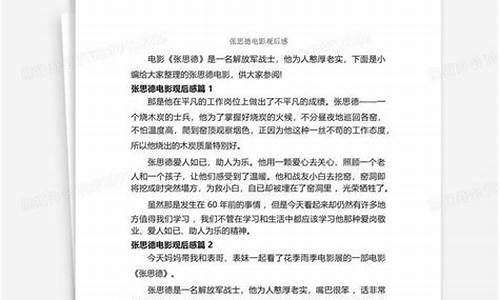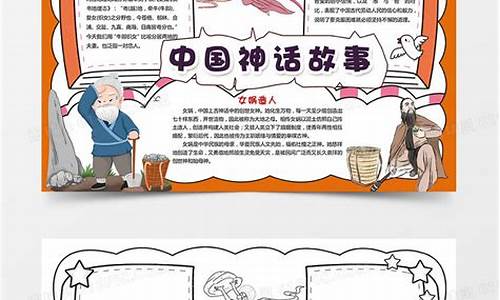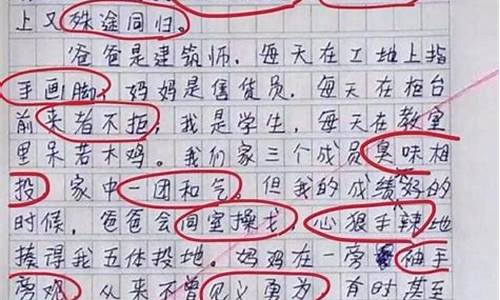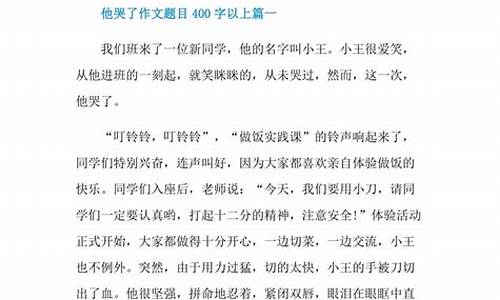您现在的位置是: 首页 > 写作指导 写作指导
关于教育的英语作文素材_关于教育的英语作文素材高中
ysladmin 2024-05-25 人已围观
简介关于教育的英语作文素材_关于教育的英语作文素材高中 关于教育的英语作文素材是一个非常复杂和重要的话题,需要深入研究和思考。我将尽力为您提供相关的信息和建议。1.关于应试教育和素质教育的英语作文2.求有关教育的英语作文 1000字左右3.英语作
关于教育的英语作文素材是一个非常复杂和重要的话题,需要深入研究和思考。我将尽力为您提供相关的信息和建议。
1.关于应试教育和素质教育的英语作文
2.求有关教育的英语作文 1000字左右
3.英语作文!关于教育的 300字
4.关于大学教育的英语作文,除了客观陈述还要自己的观点。质量在高中或者以上。
5.有没有什么英语作文是关于 教育和一个国家?

关于应试教育和素质教育的英语作文
Differences Between Exam-oriented Education and Quality-oriented Education
Nowadays people are becoming increasingly aware of the importance of quality-oriented education. As far as I’m concerned, the principal difference between exam-oriented education and quality-oriented education is their purpose. They aim at improve students’ skills whether particular for exams or ready for all kinds of challenges in the future. My idea stems generally from two aspects as follows.First, we students are under the pressure of many examinations, such as college entrance examination. This is a fact and everyone should admit it. To improve students’ score, teachers and parents concentrate on developing their skills for exams. In this case, students may gain high marks and get further study. However, will they manage to overcome challenges and difficulties in the future? No one knows the answer.Second, quality-oriented education mainly aims at improving students’ skills not only for study but also for many other activities. In that case, students may have their own hobbies and abilities so that they can use their intelligence and labor to deal with all kinds of difficulties and challenges.In conclusion, quality-oriented education may make our students excellent people, both good at study and coping other kinds of things. Let’s attach much importance to it!
---------------
The Exam-oriented Education or the Quality-oriented Education
英语 04-3 边林霞
In China, debate over two educational patterns- the exam-oriented and the quality-oriented-has lasted for several decades.
Generally speaking, exam-oriented education gives priority to the scores of students. The performance of students in all kinds of examinations is the criterion of judging the success of education. Under this pattern, cramming method of teaching finds its prevalence all over the schools. In contrast to this, the quality-oriented education emphasizes all-round development. Students are supposed to lea
求有关教育的英语作文 1000字左右
1,The problem of spoiling children has been common these days. With the development of economy and technology, the quality of life has become better and better. As a result, children today are experiencing more and more enjoyment. Their parents will give me unlimited allowance to satisfy them so as to encourage their children to study harder. Consequently. children are turning in to "little princesses" and "little princes" in today's society. This is definitely not the outcome we would love to see. Since children are going to be the future of our society, it is important to train them to develop a sense of independence as well as responsiblity rather than laziness. Parents should realize the seriousness of this problem soon and start to take actions to rescue their children. Otherwise, our society will eventually move towards a direction that everyone doesn't want to face。
,2,看到一篇关于中国教育的文章,摘录给你:
Throughout the millennia, students of all ages in China have had to endure the miseries of learning by rote. Teachers have stifled creativity in the pursuit of the accumulation of facts, and parents have forced children to spend mind-numbing hours cramming for exams. But for the past year, the government has been experimenting with what could amount to revolutionary changes in China's classrooms. The aim is to make education more pleasant, more useful and, above all, to challenge students to think for themselves.
What has prompted the reforms is a belated recognition that China's education system is failing to produce enough innovative thinkers. In addition, students are deeply unhappy. A survey conducted by the Education Ministry five years ago found more than 80% of students disliked school. Dropout rates have been rising in rural areas—partly for economic reasons but also because of the stultifying atmosphere of their classrooms. Exam pressures frequently lead to suicides. According to a survey last year among senior secondary-school students and university freshmen in one area, more than 50% had considered killing themselves.
Several other countries in East Asia, including Japan, South Korea and Taiwan, are grappling with similar problems. But the implications of China's reform efforts are particularly profound. China's traditional education methods are ideally suited to a political culture that requires citizens to submit blindly to authority. By encouraging students to question their teachers and regard them as equals (even official literature now talks of fostering a “democratic” atmosphere in classrooms), China could be ushering in a new kind of relationship between the rulers and the ruled.
The problem is making it work. The government has set ambitious targets with few resources to ensure that the country's more than 10m primary- and secondary-school teachers acquire the skills and determination to change the habits of a lifetime. The reforms started in September 2001 with about 420,000 primary- and junior secondary-school students (out of a national total of more than 215m) taking part in 38 experimental zones around the country. In September this year, participation increased to 9.1m pupils in 572 zones. These figures will double next year. The Education Ministry's original idea had been to implement the reforms nationwide by 2010. But according to Liu Jian of the ministry's National Centre for School Curriculum and Textbook Development, employers from a variety of enterprises said they wanted a quicker timetable. So now the target is 2005. In 2004, similar experiments will start in secondary schools.
As is well known, books teach us to learn life, truth, science and many other useful things. They increase our knowledge, broaden our minds and strengthen our character. In other words, they are our good teachers and wise friends. This is the reason why our parents always encourage us to read more books.
3, Reading is a good thing, but we must pay great attention to the choice of books. It is true that we can derive benefits from good books. However, bad books will do us more harm than good.
如众所周知,书籍教我们学习人生,真理,科学以及其它许多有用的东西。它们增加我们的知识,扩大我们的心胸并加强我们的品格。换句话说,它们是我们的良师益友。这是为什么我们的父母终是鼓励我们要多读书的理由。
读书是一好事,但我们必须多加注意书的选择。不错,我们能从好书中获得益处。然而,坏书却对我们有害无益。
4, The drawbacks of testWentered system of education has long been noticed. Test oriented teaching fails to foster (培养) creativity or individual talent. Students cannot enjoy the beauty of leaning, because scoring high in tests is their first concern. The way teachers teach is time-consuming with slow results. Consequently graduates can not put knowledge into practice.
To maintain a better position in the approaching information age, we must realize that developing quality-oriented education is an urgent task. The new age calls for open-minded, creative and enthusiastic studentsg Their humanity qualities and practical skillB ought to be in parallel with knowledge. Otherwise China will lag behind.
Having identified the urgency, we must find solutions. Schools should change teaching concepts and improve teaching methods. Teaching methods should facilitate (有助于)the development of the interest of students and help them to form the good habit of learning by themselves. After class, students should update their proficiency (精通,熟练)through self teaching and practical use.
英语作文!关于教育的 300字
The difference between education in China and America
Everyone must be educated, that is the basic duty of a good citizen. However, different environments involve different education. I was born in China. My cousin was born in America. We recently had a discussion about the difference between education in China and America. As a matter of fact, our discussion can be classified in three principal ways: the attitude of parents, the method of school, and the objective of education.
The first point of discussion was the attitude of parents. In China, when children’s exams are not as good as their parents hoped, most parents criticize and intimidate their children: If the next exam has the same result as this exam, children will lose some of their favorite things, such as their computer, mp3 player, or even their precious basketball. This is terrible for children. Children would be mad at their parents in this bad situation but their parents tend not to care. This mortifies children. In America, when children fail their exams, most parents encourage and inspire their children. Failure is inevitable for success. They will do better than before because of this encouragement.
Another discussion point is the method of school. In China, students have fewer courses. They can do better than students of other countries in these courses, but Chinese students lack the knowledge and creativity of foreign students. However, in America, students have a lot of courses which can broaden their horizons. They have broader knowledge in certain fields of study than Chinese students, such as philosophy and the arts, but they are not better at math than Chinese students. Chinese students lack a certain amount of educational freedom which Americans enjoy.
Finally, the two different education systems have two different kinds of objectives. In China, people believe that going to school and graduating from college is only for the diploma. When students graduate from college, the diploma is most important for finding a job. In America, students go to school not only to obtain a diploma, but to also gain other types of knowledge by taking many different courses. They strive to find their unique potential in life, so they can decide what job they want to have in the future.
In the end, my cousin and I knew that the advantages and disadvantages of different education systems between China and America. Chinese students can do better at few courses than American students. But their education is Exam-oriented, which will fall into disuse as time goes by. American education is flexible, which can be approved by a great majority of people. Consequently, I and my cousin agreed that American education is better.
关于大学教育的英语作文,除了客观陈述还要自己的观点。质量在高中或者以上。
1 The present condition of rural education in the western region of China is not optimistic. Existing problems include lacking education investment, poor school-running conditions, simplified running pattern and laggard concept of education. The countermeasures are: firstly, governments at all level especially the center one should increase input to accomplish the "support the poor" project authentically and integrate all sort of social forces; secondly, the government should strengthen the building of teaching team, attach importance to ameliorate the rural teacher's wage, their living conditions and improve their professional abilities; thirdly, we should develop the minority education greatly; fourthly, solving the problem of education of girls should be regarded as a strategic case.
2 Nowadays people are becoming increasingly aware of the importance of quality-oriented education. As far as I’m concerned, the principal difference between exam-oriented education and quality-oriented education is their purpose. They aim at improve students’ skills whether particular for exams or ready for all kinds of challenges in the future. My idea stems generally from two aspects as follows.First, we students are under the pressure of many examinations, such as college entrance examination. This is a fact and everyone should admit it. To improve students’ score, teachers and parents concentrate on developing their skills for exams. In this case, students may gain high marks and get further study. However, will they manage to overcome challenges and difficulties in the future? No one knows the answer.Second, quality-oriented education mainly aims at improving students’ skills not only for study but also for many other activities. In that case, students may have their own hobbies and abilities so that they can use their intelligence and labor to deal with all kinds of difficulties and challenges.In conclusion, quality-oriented education may make our students excellent people, both good at study and coping other kinds of things. Let’s attach much importance to it!
网上找的~不错~
有没有什么英语作文是关于 教育和一个国家?
望采纳
英语作文模板:university education
Some people think that university should not provide theoretical knowledge, but to give practical training benefit to society. Do you agree or disagree? Use your own experience and knowledge to support your idea.
Nowhere in the world has the issue of student been so much debated as in our society. In this competitive society, ability of work and employment experience have become very important features of ordinary students' future; therefore, many people think that university should teach students the real knowledge that comes from practice and direct experience. The above point is certainly wrong; this essay will outline three reasons.
The main reason is that students' study will be delayed and disadvantaged. The academic knowledge of students will be hard to make greater progress in order to practical training and employment experience. In this special period of life, students have the best memory and intellect. If they do not work hard at study, they will lose it that could be balanced by neither good employment experience nor information of outside classroom. If students choose to carefully study academic knowledge in the university, they would gain a better future.
Another reason is that current knowledge of students is not enough capable to face practical training's requirements. If students are not taught professional theoretical knowledge, they just depend on the basal academic knowledge that they studied in the high school. In fact, they are really difficult to progress real practical training and gain abundant employment experience.
Last but not the least reason is the professional theoretical knowledge that it is necessary to work of future. For instance, when I graduated from university, I did not have any employment experience. But, I was hired a famous network company. I could gain this work chance, only, because of my professional theoretical knowledge.
In conclusion, the students ought to only study theoretical knowledge in the university. It is unnecessary to let university that provides plenty of practical training.
Education in China.
Education in China is a state-run system of public education run by the Ministry of Education. All citizens must attend school for at least nine years, known as the nine-year compulsory education, which the government funds. It includes six years of primary education, starting at age six or seven, and three years of junior secondary education (middle school) for ages 12 to 15. Some provinces may have five years of primary school but four years for middle school. After middle school, there are three years of high school, which then completes the secondary education. The Ministry of Education reported a 99 percent attendance rate for primary school and an 80 percent rate for both primary and middle schools. In 1985, the government abolished tax-funded higher education, requiring university applicants to compete for scholarships based on academic ability. In the early 1980s the government allowed the establishment of the first private school, increasing the number of undergraduates and people who hold doctoral degrees fivefold from 1995 to 2005.In 2003 China supported 1,552 institutions of higher learning (colleges and universities) and their 725,000 professors and 11 million students. There are over 100 National Key Universities, including Peking University and Tsinghua University. Chinese spending has grown by 20% per year since 1999, now reaching over $100bn, and as many as 1.5 million science and engineering students graduated from Chinese universities in 2006. China published 184,080 papers as of 2008. China has also become a top destination for international students. As of 2013, China is the most popular country in Asia for international students, and ranks third overall among countries.
我只能帮您这么多了,您采纳,我很高心。
好了,关于“关于教育的英语作文素材”的话题就讲到这里了。希望大家能够通过我的讲解对“关于教育的英语作文素材”有更全面、深入的了解,并且能够在今后的工作中更好地运用所学知识。








